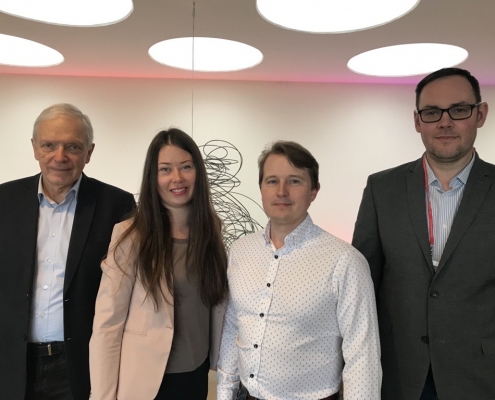Administrative Scientific meeting of the CoE RAISE Project at CERN
On January 17-20, all 11 representatives of the CoE RAISE project meet face-to-face at the European Organization for Nuclear Research (CERN) in Geneva for the first time during the project, to discuss the progress made so far and the work to be done by the end of 2023.
In Latvia, the CoE RAISE project is represented by Riga Technical University (RTU), involving the computational resources of the RTU HPC Centre.
“Meeting in CERN promises to be very active and dynamic. Together, we will go through the tasks of the project in-person and discuss what has been done so far and what remains to be done by the end of the project. This is the third year of the project – the final year – and this meeting will be very important for all of us, because everyone will finally meet for the first time in-person, and will be able to share our experience of the work so far,” says Arnis Lektauers, the scientific manager of the CoE RAISE project in Latvia, shortly before the trip to CERN.
In Europe, there is currently no unified approach to combine artificial intelligence (AI) with high-performance computing (HPC) environment. Therefore, during the project, it is planned to create a framework for the efficient execution of AI tasks in an HPC environment, focusing on exa scale – the most powerful systems.
Project participants will discuss all project tasks during the meeting, where each task has its own specifications and leading partners.
Cooperation with Barcelona and Open HPC Education
As partners of the CoE RAISE project, RTU is working with Barcelona Supercomputing Center, which is currently developing a model of wind turbines that could be powered in an HPC environment using artificial intelligence techniques. “For the exchange of experience to take place, each Coe RAISE project task has a number of partners. Colleagues from Spain are specialists in the implementation of wind turbines, but we have specialized in HPC and AI. This is the challenge of how to effectively establish cooperation remotely from each other. Therefore, this face-to-face meeting is very important for all of us,” says Arnis Lektauers.
The second major task of the RTU (or using project terminology – Work Package 6), in which the RTU is the leading partner, is to establish a learning platform for the acquisition of HPC and AI knowledge.
It is important to mention RTU’s work with one of its project partners – CERN – which plans to launch the improved Great Hadron Accelerator in 2027. While the Coe RAISE project is not focused on launching the big Hadron Accelerator, it involves one of the project’s tasks in providing software for this Hadron Accelerator. In collaboration with CERN, RTU is working to improve one of the software solutions planned to be used in the new version of Hadron Accelerator. Data from the new Hadron Accelerator will be at least 40 times larger than it has been so far, therefore software and hardware requirements are also increasing.
We remind that the CoE RAISE project is being carried out at the RTU HPC Centre and the project is funded by the European Commission under the Horizon 2020 Framework Programme, European research infrastructures (including e-Infrastructures). In RAISE, researchers from science and industry develop novel, scalable AI technologies towards Exa-scale along representative use-cases from Engineering and Natural Sciences.
Prepared by: Kintija Bulava, RTU HPC Centre’s communications officer
Photo: publicity



